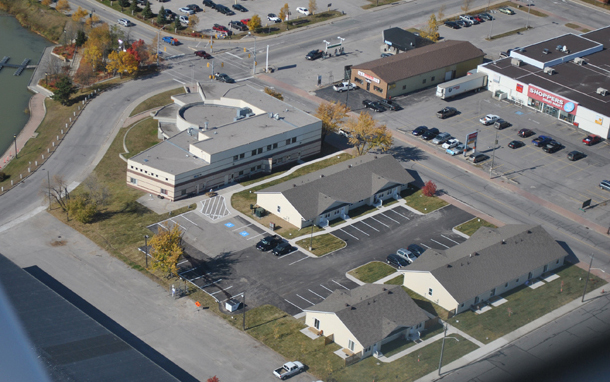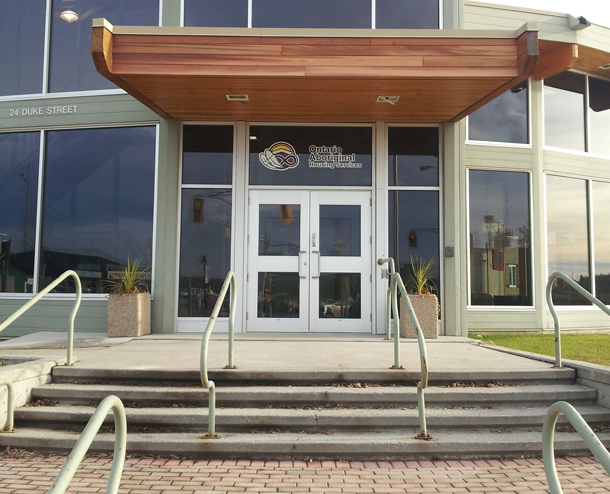Yesterday we introduced you to single mother Blaine Clayton, who lost her BC Housing subsidized unit when she went into residential treatment for alcohol use. Despite her hard-won sobriety, the loss of the two-bedroom apartment meant Clayton spent almost 10 additional months apart from her kids before the family was reunited.
This wasn't supposed to happen: B.C.'s Ministry of Children and Family Development, and BC Housing, the provincial subsidized housing provider, are supposed to work together to keep families safely housed and intact in the best interests of children. But parents like Clayton fall through the cracks, putting their housing, and their families, at risk.
Today, Clayton's got her kids back full-time in a three-bedroom transitional housing unit. With less than a year to find permanent housing though, she sits on waitlists and scours Vancouver's notoriously thin and expensive private rental market for a unit a single mom on welfare can afford.
She may not find the answer to her housing woes in Vancouver. But there is a place that has found a solution that Vancouver might think about: Dryden, Ontario, a community of fewer than 8,000 people about halfway between Thunder Bay and Winnipeg.
In response to the lack of affordable housing in the town for low-income singles, families and seniors, in 2012 Ontario Aboriginal Housing Services opened a 30-unit housing project specifically for Dryden's hidden Indigenous homeless population.
"In Dryden, there are some private sector landlords," said Housing Services executive director Don McBain. "But if you look at the shape of their stock, it's deplorable. And that was the only other affordable housing here."
The main component of the Dryden project is a former convention centre-style building, once home to a training centre, now converted into 13 single room occupancy suites, and five one-bedroom lofts renting at $500/month for low-income seniors and singles.
Twelve two-to-three bedroom townhouses surround the building, renting at $750/month, utilities included, to families on income assistance or who are working poor. The majority of those families are single mom-led like Clayton's.
The elders in the SROs are providing informal childcare, allowing parents to go to work, school, or run errands without their kids. In turn, "the children get a little bit more of their historical background, because it's kind of lost to the rest of the community," said McBain.
Changes are profound
Promising as it is, the Dryden project is only a drop in the bucket of need in the area. Waitlists for OAHS housing in the northwest region from Thunder Bay to the Manitoba border typically hold the names of 150 families and singles at any time.
Even after developing "more affordable housing over the last five years than has been developed in the last 30," McBain said, a total of 230 units, "we could build another 1,000 units and still have waitlists."
To that end, OAHS is in talks with Toronto's WoodGreen Community Services and the Ontario Federation of Indigenous Friendship Centres (OFIFC) who have been conducting a feasibility project with a handful of Friendship Centre communities, including the Dryden Native Friendship Centre, to pilot an urban Aboriginal adaptation of WoodGreen's Homeward Bound program.*
OFIFC, participating Friendship Centres and OAHS are still working with WoodGreen to tailor the pilot projects to the specific needs of the respective communities. But the original Homeward Bound still operating in Toronto is designed to help low-income single mothers move out of poverty by providing women with a furnished, subsidized apartment, tuition for a two-year college program, childcare, and a 14-week internship with an industry partner in the woman's area of study. The support runs for four years, enough to carry her through school and hopefully the first year of work.
The original Homeward Bound program, which is currently supporting 76 single-mom families, the majority on income assistance, is demanding -- and correspondingly tough to get into.
"We don't want to set anybody up for failure," said Pauline Hockenstein, the program's director.
In the first of the program's four phases, enrolees spend six months in academic upgrading, life skills training, and financial literacy courses. But women must be ready immediately after to start a two-year college program. Each is assigned a caseworker to help her succeed, but failing more than two college courses means footing her own tuition bill.
College programs available to the women enrolled are limited by the industries that sit on Homeward Bound's Industry Council. It's these companies that provide internships, and for over 70 per cent of Homeward Bound's alumni, eventual jobs with the company where they intern. The fields include banking, law, and accounting, as well as WoodGreen's own childcare centres.
Despite the high demands, about 95 per cent of women who begin the four-year program complete it. And the subsidized, furnished apartments Homeward Bound provides are a critical factor in that success. Without the stability housing provides, Hockenstein said, it can be next to impossible for women to improve their or their children's lives.
"For the right participants, it's been transformational," she said. "On so many different levels the changes are profound."
Looking down the road, across Canada
In Dryden, McBain's OAHS hopes to have the first five families housed as part of a local urban Aboriginal Homeward Bound program in the next year, living in a new building of 15 two-bedroom units potentially next to the agency's existing project. Five families will be added annually over the next two years. It's also planning an on-site formal daycare centre for all its families.

McBain, however, is thinking beyond that, to partnering with other housing providers to extend supportive accommodation beyond four years. "We don't want people to go through the entire training process, get to the point where they now have the ability to be fully employed," he said, and "still (not) have a place to live."
The original Homeward Bound is funded 60 per cent through private donations and 40 per cent by government. But OAHS plans to help fund urban Aboriginal Homeward Bound pilots -- other Friendship Centre communities involved include Timmins, London and Niagara, ON -- with contributions from the federal government's recently announced commitment of an additional $1 billion for non-profit housing that he hopes will be matched by the Ontario government. If McBain's hopes work out, that funding "doubles our budget over the next two years. We'll be delivering another $8-million worth of programming in each of those two years."
Not every parent struggling with housing for their kids is a single mom or ready to go back to school. But in Dryden, at least, they now have more choices designed for a variety of low-income families on the brink of homelessness.
It's possible, McBain says, for the new flow of federal money for affordable housing to help replicate that model across Canada, perhaps even in Blaine Clayton's overheated Vancouver.
*Story clarified April 15 at 2:45 p.m. ![]()
Read more: Housing
















Tyee Commenting Guidelines
Comments that violate guidelines risk being deleted, and violations may result in a temporary or permanent user ban. Maintain the spirit of good conversation to stay in the discussion.
*Please note The Tyee is not a forum for spreading misinformation about COVID-19, denying its existence or minimizing its risk to public health.
Do:
Do not: